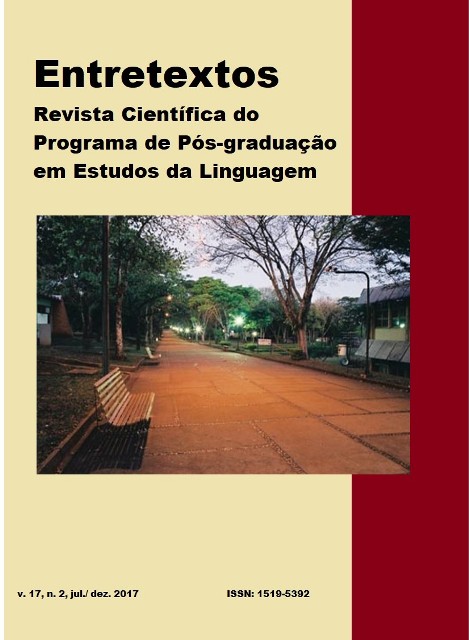Task based learning and the development of the English language as a second language: Analyzes based on an Ecological Perspective
DOI:
https://doi.org/10.5433/1519-5392.2017v17n2p175Keywords:
Task based learning, Ecological linguistics, Task cycle, ComplexityAbstract
The aim of this article is to analyze Task Based Learning, more specifically the task cycle under the perspective of the Ecological Linguistics. In addition, it also aims to analyze the affordances which influenced the paths taken by the students when developing the target language, in this case English as a second language (L2). In order to reach these aims, after a short introduction, this article describes the Task Based Learning and immediately after approaches the main aspects of the ecological perspective to L2 development concentrating on two specific topics: affordances and emergence. The methodology of the study is then presented and the data are described in order to identify the characteristics of a complex ecological system in the task cycle. The study identified the following classes of ecological interaction: mutualism, commensalism, competition and parasitism. The most frequent class was the mutualism when students benefit equally from the interaction.
Downloads
References
GAIGNOUX, Kelly Cristina M; MOUTINHO, Michell Gadelha. As condições iniciais na construção de uma rede de ideias e reflexões. In: SILVA, Walkyria Magno; BORGES, Elaine Ferreira do Vale (Org.). Complexidade em ambientes de ensino e de aprendizagem de lÃÂnguas adicionais. Curitiba: CRV, 2016.
GIBSON, James J. The ecological approach to visual perception. 2. ed. Hillsdale: Lawrence Erlbaum Associates, 1986.
KRAMSCH, Claire. Ecological perspectives on foreign language education. Language Teaching, Cambridge, v. 41, n. 3, p. 389-408, 2008.
KRAMSCH, Claire; WHITESIDE, Anne. Language ecology in multilingual settings. Towards a theory of symbolic competence. Applied Linguistics, Oxford, v. 29, n. 4, p. 645-671, 2008.
KRASHEN, Stephen D. Principles and practice in second language acquisition. Oxford: Pergamon, 1982.
KUMARAVADIVELU, B. Understanding language teaching: from method to postmethod. Londres: Lawrence Erlbaum Associates, 2006.
LARSEN-FREEMAN, Diane. Chaos/complexity science and second language acquisition. Annual Review of Applied Linguistics, v. 18, n. 2, p. 141-165, 1997.
LARSEN-FREEMAN, Diane; CAMERON, Lynne. Complex systems and applied linguistics. Oxford: Oxford University Press, 2008.
LEFFA, Vilson José. Ensino de lÃÂnguas: passado, presente e futuro. Pelotas: Educat, 2003.
LONG, M. H. A role for instruction in second language acquisition: task-based language training. In: HYLTENSTAM, Kenneth; PIENEMANN, Manfred (Ed.). Modeling and assessing second language development. Clevedon: Miltilingual Matters, 1985. p. 77-99.
LOPES JÃÅ¡NIOR, Juarez Aloizio. Aprendizagem da lÃÂngua inglesa como segunda lÃÂngua baseada em tarefas: uma proposta de trabalho com ciclo complexo. 2014. Dissertação (Mestrado em Letras) - Centro de Letras e Comunicação, Universidade Federal de Pelotas, Pelotas, 2014.
NUNAN, David. An organic approach to grammar teaching. Hong Kong Journal of Applied Linguistics, Hong Kong, v. 1, p. 65-86, 1996.
ODELL, James. Agents and emergence. Distributed Computing, Berlin, p. 45â€" 50, oct. 1998. DisponÃÂvel em: http://www.jamesodell.com/DC9810JO.pdf. Acesso em: 31 Out. 2016.
PAIVA, Vera Lúcia Menezes de Oliveira. Aquisição de segunda lÃÂngua. São Paulo: Parábola, 2014.
PAIVA, Vera Lúcia Menezes de Oliveira. Interação e aquisição de segunda lÃÂngua: uma perspectiva ecológica. In: GERHARDT, Ana Flávia Lopes Magela; AMORIM, Marcel ÃÂlvaro de; CARVALHO, ÃÂlvaro Monteiro (Org.). LinguÃÂstica aplicada e ensino de lÃÂngua e literatura. Campinas: Pontes Editores, 2013. p. 187-205
PRABHU, N. S. Second language pedagogy. Oxford: Oxford University Press, 1987.
SKEHAN, Peter. A cognitive approach to language learning. Oxford: Oxford University Press, 1998.
SKEHAN, Peter. Review article: task-based instruction. Language Teaching Research, Pennsylvania, v. 36, p. 1-14, 2003.
VAN LIER, L. From input to affordance: social-interactive learning from an ecological perspective. In: LANTOLF, James (Ed.). Sociocultural theory and second language learning. New York: Oxford University Press, 2000. p. 245- 259.
VAN LIER, Leo. The ecology and semiotics of language learning: a sociocultural perspective. Monterey: Kluwer Academic Publishers, 2004.
VAN LIER, Leo. The ecology of language learning: practice to theory, theory to practice. Procedia: social and behavioral sciences, [S. l.], v. 3, p. 2-6, 2010.
WATSON-GEGEO, Karen Ann. Ethnography in ESL: defining the essentials. In: BROWN, Douglas; GONZO, Suzan T. Readings on second language acquisition. Englewood Cliffs, NJ: Prentice Hall, 1995. p. 36-54.
WILLIS, Dave; WILLIS, Jane (Ed.). Doing task-based teaching. Oxford: Oxford University Press, 2007.
WILLIS, Jane. A framework for task-based learning. Harlow: Longman, 1996.
Downloads
Published
How to Cite
Issue
Section
License
Copyright (c) 2017 Entretextos

This work is licensed under a Creative Commons Attribution 4.0 International License.
Entretextos adota a Licença Creative Commons Attribution 4.0 International, portanto, os direitos autorais relativos aos artigos publicados são do/s autor/es.
Sob essa licença é possível: Compartilhar - copiar e redistribuir o material em qualquer suporte ou formato. Adaptar - remixar, transformar, e criar a partir do material, atribuindo o devido crédito e prover um link para a licença e indicar se mudanças foram feitas.























